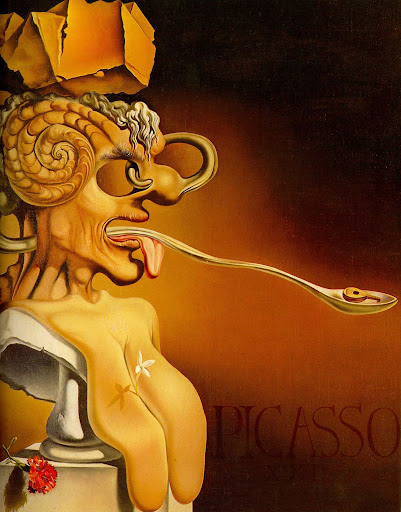Salvador Dali
“I’ll be a genius, and the world will admire me. Perhaps I’ll be despised and misunderstood,
but I’ll be a genius, a great genius.” -
Written in Dali’s diary at the age of 16.
In 1901, Don Salvador Dali y Cusi
and Felipa Domenech Ferres had a child, whom they named Salvador. At age two, Salvador died. Grief-stricken, the couple’s immediate
response was to have yet another child. In
1904, Salvador Dali was born in Figueres, located in northern Spain. They had given Salvador the same name as his
deceased brother, a decision which Salvador would later lament in his
autobiography The Secret Life. Recovering from their recent loss, the
parents showered Salvador with love and attention. Growing up in an
environment in which he had replaced another, it is little wonder that Salvador
began developing strange and morbid interests at a young age.
“Every morning when I awake, the greatest of joys is mine:
that of being Salvador Dali.”
-
Salvador Dali
My interest
in Dali was born when a friend showed me some of his paintings. Their intense strangeness, their bizarre
pull, captured me. I’m no art history
major, and learned very little about the lives of artists in high school. But as images with his name attatched to them
repeatedly caught my eye during my trips to the library, I decided to do a
little research. As soon as I had seen
the quote at the top of this post, I knew I had stumbled upon the right person.
For the
longest time, I have had an aesthetic inclination towards the morose, macabre, and
morbid. But perhaps even more
importantly, I have been obsessed with the notion of genius, of becoming a
genius. Reading the three quotes struck
a chord in me, because I had long since come to the conclusion that Self-Faith,
by virtue of a powerful “placebo effect,” was capable of producing the results
we see in Dali—that of creative genius.
This may seem like a silly idea, but apparently it worked for Dali, for
he was utterly convinced of his own genius.
His personality was one of wild ambition shocked by supreme
arrogance. If one decides to use arrogance
as a psychological tool for success, then I think it would be wisest to temper
this arrogance with a strong dose of self-honesty, lest the arrogance get the better
of you and halt growth. I don’t know
whether Dali let arrogance get the better of him, or if he “knew what he was
doing” the whole time, but the following quote seems to suggest that, at least
at one point, the latter was the case:
“Oh Salvador, now, you know the truth; that if you act the
genius, you will be one.”
-
Salvador Dali
But besides being a character who
would make an excellent subject of study if one were interested in discerning
the psychologies of geniuses, I really like his art. Like I said, I’m no art history major, so I
can’t pull apart and examine his images conceptually, but I can at least
describe their imaginative impact on me.
Take the following image, for example:
Soft Construction with Boiled Beans (Premonition of Civil
War)

This is a surrealist painting (Dali might have called it “Concrete
Irrationality”), and many of Dali’s most famous works are surrealist. It is grotesque, but it’s somehow this very
ugliness which keeps me from looking away.
There is something intensely satisfying about keeping my eyes glued to
the image, about making myself at home in this morbidity. Salvador supposedly spent two years
constructing this image, starting sketches for it as early as 1934 (exhibited
in 1936).
Dream Caused by the Flight of a Bee Around a Pomegranate One
Second Before Awakening

1944. Inspired by a
dream which Gala (Dali’s wife) had about a pomegranet and a bee.
Portrait of Pablo Picasso in the twenty first century

1947. Dali had
apparently developed a love-hate relationship with Picasso, admiring but
competing with his work.
Work Cited:
Barnes, Rachel. Salvador
Dali. London, England: Quercus, 2009. Print.
No comments:
Post a Comment